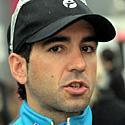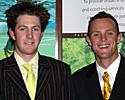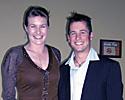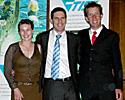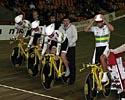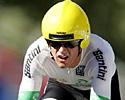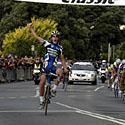First Edition Cycling News for November 12, 2005Edited by John Stevenson Yus accused of possessing growth hormone
French newspaper l'Equipe has accused former Bouygues Telecom rider Unai Yus of possessing human growth hormone just prior to his expulsion from the Vuelta a Espana in September. Yus was sent home by his team before stage 10 of the Vuelta on September 5, and subsequently sacked. At the time the team said he had been found in possession of substances that were not on the team's official medicine list. The next day, Yus claimed that the material found in his room by a routine team check was a variety of "recovery products which are absolutely legal in Spain." However, according to l'Equipe, Bouygues Telecom director Jean-René Bernaudeau told the newspaper the search of Yus' room had uncovered vials of human growth hormone. The content of the vials was later confirmed by analysis at a laboratory in Paris, Bernardeau said. Yus has denied that he was carrying growth hormone at the Vuelta. In a statement to Spanish press agency EFE he said was had, "categorically not carried growth hormone at the Vuelta a Espana." Yus said that he has requested Bernaudeau confirm that he told was the source of l'Equipe's information, and he had, "placed this very serious accusation in the hands of my lawyers who are considering legal action against the people that made it." Liberty will fire HerasRoberto Heras' Liberty Seguros team says it will have no option but to fire Heras if the B-sample test from stage 20 of this year's Vuelta confirms the A-sample finding that he used EPO during the Vuelta. "If the positive is confirmed he will have to leave Liberty Seguros," team manager Pablo Anton told Spanish sports daily AS. "All the teams in the UCI ProTour have signed a code of ethics which states that any rider who tests positive will be fired." Heras' B-sample test is scheduled to be conducted at three separate labs on November 21. Anton says the team will wait until then before taking any action. "He has been suspended provisionally, but up until that date we will be supporting him," said Anton. "We should respect his rights and a presumption of innocence until then." Heras continues to maintain his innocence, and told Marca that the news of the positive test was, "the worst moment in my sporting career." However, Heras said, "I don't want to portray myself as a victim. I believe it is a laboratory error and I'm concentrating all my efforts on proving it and that's why I've got a specialist lawyer on the case." Heras is relying on previous false-positive A sample tests for EPO involving athletes from Spain and other countries. In 2001 Spanish track cyclist Joan Llaneras returned a non-negative A sample after the world championships in Antwerp, but was subsequently exonerated by the B-sample analysis. Earlier this year Italian rider Fabrizio Guidi (Phonak) also came up non-negative after a test at the HEW Cyclassics on July 31. Phonak suspended Guidi, but he was later found negative by the B-sample analysis . In both those cases the negative finding came from a B-sample analysis conducted by the French anti-doping lab at Châtenay-Malabry, which is one of the three labs that will test Heras' B-sample. A more complex recent case, that of Belgian Triathlete Rutger Beke, revealed problems with the EPO test, which in certain circumstances can produce a false positive even if conducted properly. Jesus Manzano: "The whole tree is rotten"Former Kelme rider Jesus Manzano, who last year rocked Spanish cycling with allegations of systematic doping within Kelme, has waded into the controversy around Roberto Heras' non-negative A sample test. Manzano told AS that he was not surprised by Heras' test result. "It doesn't surprise me that Roberto is positive," said Manzano, " not him or any other. What seems obvious to me is that Roberto is not the only one." For Manzano, the accusation against Heras comes as a vindication. "They said I was just one rotten apple, but I believe the entire tree is rotten. It's not just Roberto. The others need to speak!" Manzano singled out the doctors that help prepare riders for races for particularly scathing criticism. "It is all about money," he said. "The ones getting rich are the doctors, not the riders. Heras has earned a good salary, but most of us don't earn anything like that. But I have seen a doctor ask six million pesetas for his services [about US$40,000]. For aspirins and mineral supplements you charge six million?" While at Kelme, Manzano rode with both Heras and Aitor Gonzalez, who also turned in a positive test at this year's Vuelta. But he was not surprised that two Vuelta winners had returned positive tests. "Do you think you win the Vuelta on chocolate and bread?" said Manzano. Cyclists take out top gong in Tasmanian sport awardsLouise Yaxley back on her feet, and engagedBy Gerard Knapp in Hobart, Tasmania Emerging Australian riders Matt Goss and Mark Jamieson shared the top prize for male athletes at the Tasmanian Institute of Sport (TIS) annual athlete of the year awards in Hobart on Friday, November 11, 2005.
It capped off a golden week for the two riders, who were tearing up the boards in the Moscow velodrome as part of the Australian team pursuit squad that won the gold medal in the first round of the UCI Track World Cup for 2005/06. Goss, who turned 19 while competing in Moscow, and Jamieson, 23, are both former junior world champions on the track and are emerging as key riders in the dominant Australian track endurance program. However, in accepting their awards, neither rider assumed they had a confirmed spot in the ultra-competitive Australian team pursuit squad. The team has the Commonwealth Games next March as its key target and last year an 'all-star' Australian team including riders such as Brad McGee and Graham Brown smashed the world record when winning gold at the Athens Olympics.
Both of the younger riders also have recorded excellent results on the road, with Jamieson taking sixth place in the U23 individual time trial at the World Road Cycling Championships in Madrid in September. The awards night was also significant for Louise Yaxley, a TIS cyclist who was one of the Australian Institute of Sport (AIS) riders seriously injured in Germany on July 18, when an out-of-control car smashed into her team when out training. The crash took the life of her team-mate Amy Gillett and put the other five riders in hospital. Yaxley was one of the most seriously injured and was in a critical condition for several days after the crash. However, her recovery is progressing well the TIS awards dinner was one of her first opportunities to 'dress-up' and make a public appearance. Yaxley was in good spirits, considering her traumatic year, no doubt buoyed by her recent engagement to her boyfriend, Mark Padget. Yaxley received warm applause when she took the stage to present a special achievement award to the former TIS head cycling coach, Kevin Tabotta, who's moved on to become the high performance manager of Cycling Australia earlier this year.
Tabotta has been replaced by the popular Paul Brosnan, but in his seven year-term as head cycling coach, Tabotta is credited with reinvigorating the cycling program in the state, culminating with his state team pursuit squad taking out the national prize at this year's national track championships, a first for Tasmania. (Note: Cyclingnews is a sponsor of the TIS cycling program.) Wiggins wants Tour prologueBritish rider Bradley Wiggins, gold medalist in the individual pursuit at the 2004 Olympics, has set his sights on wearing the Tour de France yellow jersey after the prologue of the 2006 edition. "Winning the prologue is my number-one goal for the coming season," Wiggins told the BBC. "Putting that yellow jersey on is the pinnacle of any cyclist's career - more so even than Olympic gold." Long considered Britain's most promising young rider, Wiggins delivered on that promise on the track, winning silver and bronze medals in Athens as well as his pursuit gold. He was not selected by Credit Agricole for the 2005 Tour, but says his new team, Cofidis, is backing him for the 2006 race. "The new team are really behind me for winning the prologue," he said, "and it certainly played a part in the move. I felt I should have been included in Credit Agricole's team at the last Tour. At the time I was in really good form but that's part and parcel of professional cycling." The 2005 Tour began with a 19km time trial that might perhaps have been a bit long for a rider with a pursuit background. The 2006 edition's 7km prologue should be more to the liking of Wiggins and other prologue specialists such as Bradley McGee. "The opener at the Tour de France plays perfectly into my hands," said Wiggins. "It's the sort of distance I won Olympic gold over. It'll be exciting to see what form I'm in and what happens. And I'm going there with the sole purpose of winning that, which I know could come down to just a hundredth-of-a-second." Eltink renews with RabobankTheo Eltink will stay with Rabobank for the next two seasons the team has announced. Eltink has reached an agreement with general director Theo de Rooij over a contract extension and will now ride in Rabobank colours through 2007. The 2006 season will be Eltink's tenth with the Rabobank teams. He started in 1997 with the team's junior squad run by Frans Maassen and stepped up to the Rabobank ProTeam in 2005. In total Eltink has contributed with 13 victories to the success of the Rabobank teams. CPA criticises Le TourThe professional cyclists' association (CPA) has joined the chorus of criticism of the attitude of Tour de France toward rides, as demonstrated at the recent launch of the 2006 Tour. At that presentation, outgoing Tour director Jean-Marie LeBlanc made no mention of seven-time winner Lance Armstrong, and the CPA is miffed that neither LeBlanc nor anyone else from the Tour organisation made much mention of the riders, without whom the Tour would be a rather pointless advertising motorcade. In its most recent newsletter, the CPA said, "The CPA considers it regrettable that, in the speeches made during the presentation of the Tour de France 2006, almost no mention was made of the riders. No tribute was paid to the winners of the various individual rankings, however attending the event. The CPA allows itself to remind that the riders are the ones who, thanks to their achievements, indisputably contribute to the importance and the fame of the cycling races." Summarising its recent general meeting, the CPA also suggested that the three grand tours - the Tour de France, Vuelta a Espana and Giro d'Italia - should all be shortened by four days, and some one-day and stage races should be run over shorter distances. "That would give the riders the possibility to program their season on the basis of 80-85 days of racing per annum, which is considered as reasonable for an athlete," said the CPA. The organisation also criticised safety provisions at the Giro di Lombardia. "The General Meeting decided to send a protest letter to the UCI with matter of the general conditions of the course of the 2005 Tour of Lombardy in order to protest against the total lack of lighting in 3 tunnels, the bad condition of the surface of the roadway on certain parts of the course and the difficult crossing of some villages," said the CPA. "All those points do not correspond indeed to the organisation criteria a UCI ProTour event must fulfil." (All rights reserved/Copyright Knapp Communications Pty Limited 2005) |

|
January 2009 |
Recently on Cyclingnews.com |

